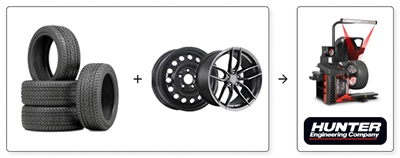Tire Wear on Electric Vehicles: What You Need to Know for Safe Driving

The increase in electric vehicles (EVs) on Canadian roads signifies a shift in our driving habits and vehicle maintenance needs. EVs, such as the Tesla Model Y, Volkswagen ID.4, and Chevrolet Bolt, bring new considerations, especially regarding tire wear. This article explores the specifics of tire wear on EVs and offers advice on maintaining your tires in good condition, enhancing your safety, and optimizing your vehicle's performance.
Why is Tire Wear Different on Electric Vehicles?
A recent study conducted by Epyx, a British company specializing in fleet management, highlights the significant impact of electric vehicles on tire wear. According to the survey, which analyzed data from several thousand vehicles owned by companies, tires on electric cars need to be changed more frequently than those on traditional powertrain vehicles. On average, tires on electric vehicles had to be replaced after 29,000 km, compared to 40,000 km for hybrid vehicles and 39,000 km for internal combustion engine models.
Electric vehicles, such as the Tesla Model S, are known for their instant acceleration and heavier weight due to batteries. These characteristics put considerable strain on the tires. For example, the Tesla Model S can accelerate from 0 to 100 km/h in as little as 2.3 seconds, a capability that can lead to faster tire wear due to the force exerted during acceleration. Additionally, the extra weight of EVs increases pressure on the tires, which can accelerate wear if the tires are not specifically designed to support this weight.
What Types of Tires Should You Choose for Your Electric Vehicle?
Selecting tires suited to the specifics of EVs is crucial to ensure performance, durability, and safety. Brands like Michelin, Bridgestone, and Goodyear offer ranges specifically designed for EVs, such as:
- Michelin e.Primacy
- Michelin Pilot Sport EV
- Bridgestone Turanza EV
- Goodyear ElectricDrive GT
- Sailun Tire Erange EV
These tires are optimized to support the weight of EVs and reduce rolling resistance, contributing to maximizing battery range. They are also designed to offer a reduced noise level, thus improving the driving comfort unique to electric vehicles.
How to Extend the Life of Your Tires on an Electric Vehicle?
-
Regular Pressure Checks: Maintaining the tire pressure recommended by the manufacturer, such as the 42 psi suggested for the Tesla Model Y, is essential to prevent premature wear.
-
Tire Rotation: Rotating the tires every 10,000 km can help balance wear, particularly important for all-wheel-drive vehicles like the Tesla Model Y LR.
-
Gentle Driving: Although the power of EVs is tempting, a smoother and more gradual driving style preserves the tread of the tires.
Recognizing Wear Signs and Knowing When to Replace
It is crucial to replace your tires at the right time to ensure the safety and performance of your EV. Signs to watch for include uneven wear, visibility of wear indicators, and changes in handling or unusual noises. For instance, if your EV's tires show pronounced wear on the edges, this may indicate chronic under-inflation or a need for alignment adjustment.
Conclusion
Proper tire maintenance is fundamental to getting the most out of your electric vehicle. By choosing the right tires, maintaining them properly, and staying alert to signs of wear, you will optimize the safety, performance, and energy efficiency of your EV. At PMCtire.com, we are dedicated to providing you with expertise and a selection of top-choice tires to meet all your electric vehicle needs. Trust us to support you in your transition to a more ecological and efficient driving experience.


